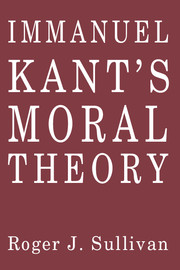Book contents
- Frontmatter
- Contents
- Preface
- Key to abbreviations and translators
- 1 Introduction
- 2 The context for Kant's moral philosophy
- Part I The nature of morality
- Part II The moral norm for persons
- 9 Moral character: Part I
- 10 Moral character: Part II
- Part III The norm for moral judgment
- Part IV Kant on history, politics, and religion
- Appendixes
- Notes
- Bibliography
- Index of names
- Index of subjects
9 - Moral character: Part I
Published online by Cambridge University Press: 05 June 2012
- Frontmatter
- Contents
- Preface
- Key to abbreviations and translators
- 1 Introduction
- 2 The context for Kant's moral philosophy
- Part I The nature of morality
- Part II The moral norm for persons
- 9 Moral character: Part I
- 10 Moral character: Part II
- Part III The norm for moral judgment
- Part IV Kant on history, politics, and religion
- Appendixes
- Notes
- Bibliography
- Index of names
- Index of subjects
Summary
Any ethical theory must address two distinct but related questions: What makes an action morally right? and What makes a person morally good? Since Mill, asking the first question generally has been understood as asking what behaviors are morally acceptable. By contrast, questions about the nature of good character traditionally have been taken to be queries about the inner structure of an individual's personality, with emphasis on a person's motivation.
Kant holds that ordinary people do not find it difficult to recognize that these are different questions. (See Lect. 279–80/47–48.) Yet, as we saw at the end of Chapter 3, Kant himself tends to treat them as a single question, because he regards moral worth as prior to and so as definitive of what is morally right, and also because he so often thinks of actions primarily as intentions rather than as behaviors. He does just this, for example, in the first chapter of the Groundwork, where he defines the supreme principle of morality in terms of a person's intentions: What makes an action morally right is that it originates in a person's good will, that is, with the adoption of a maxim fit to serve as a universal practical law.
- Type
- Chapter
- Information
- Immanuel Kant's Moral Theory , pp. 117 - 130Publisher: Cambridge University PressPrint publication year: 1989



